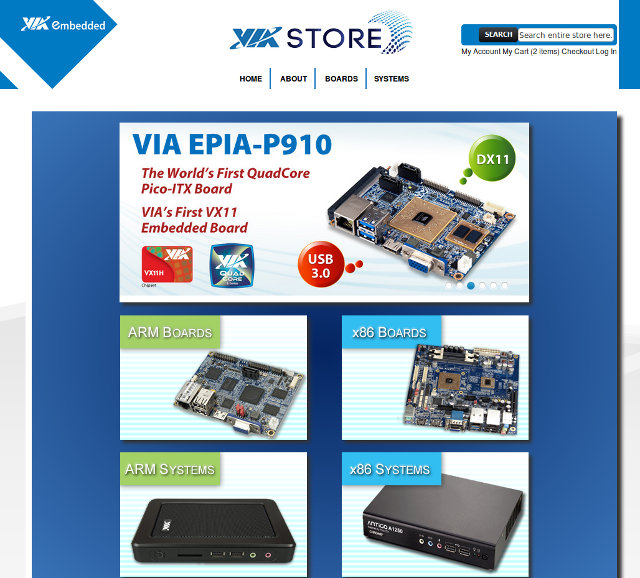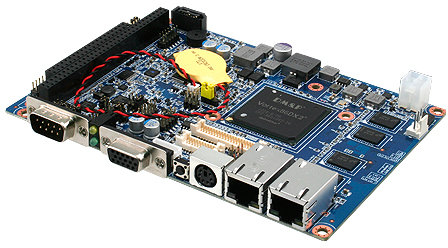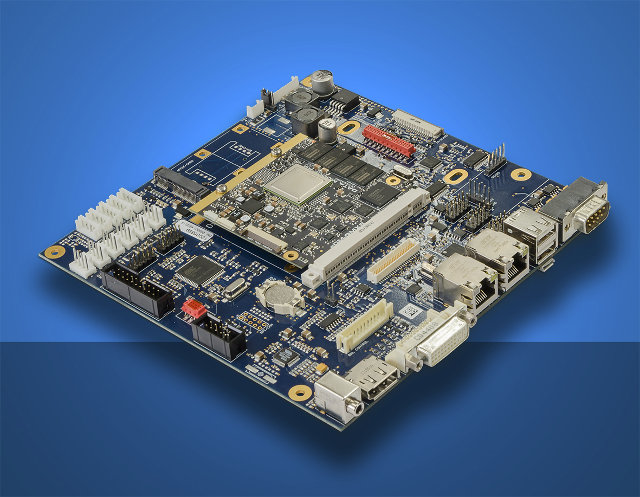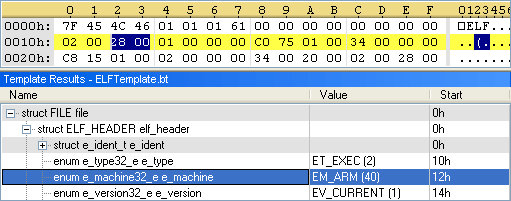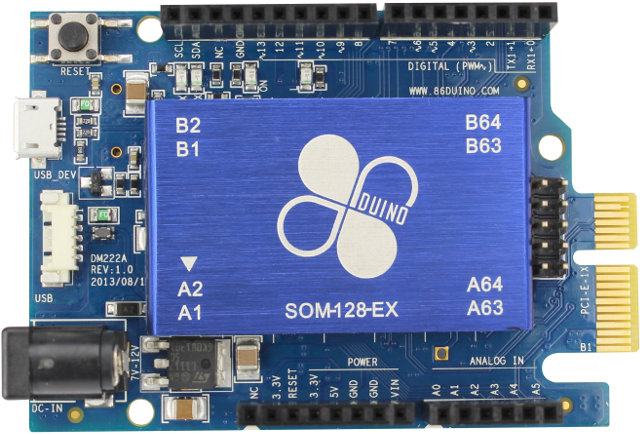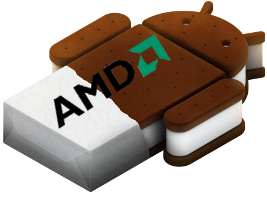Most of the time for boards and systems targeting industrial or embedded applications, companies will not provide pricing information, and if you want a sample for evaluation, or want to order a few for a project requiring limited quantities, you’ll need to contact sales, talk about your project, volume, schedule, etc… But for VIA Embedded boards and systems, you won’t need to go through this loop anymore, as the company has just launched VIA Embedded Store where you can buy boards such as VAB-820 pico-ITX board or a rugged system such as AMOS-820 directly online without questions asked. I’ve gone through most of the checkout procedure and you can proceed as a guest or by registering, and they’ll just ask billing and shipping information, shipping method, and payment method selection (Only Paypal at this time). It’s a simple as that, no need to fill some “I’m not a terrorist” forms […]
Avalue ECM-DX2 3.5″ Single Board Computer Features DM&P Vortex86DX2 SoC
Avalue Technology, a company specialized in industrial and embedded single board computers, has recently announced ECM-DX2 3.5” single board computer (SBC) micro module powered by DM&P Vortex86DX2 SoC with up to 1GB RAM, support for LVDS, TTL, and VGA video outputs, SATA, dual Ethernet, and more. The board targets embedded applications such as industrial controls & automation, the railway industry, cleantech, transportation/vehicle construction and aviation applications. Avalue ECM-DX2 specifications: SoC – DM&P Vortex86DX2 single core @ 800 MHz with integrated graphics and chipset System Memory – 1GB DDR2 Memory Storage – 1 x SATA II, 1x CompactFlash Type I/II socket, and 2MB SPI (Flash BIOS). Expansion – PC/104 Expansion (8/16-bit ISA), 1 x Mini PCIe Card I/O MIO – 2 x RS-232, 2 x RS-232/422/485, 1 x PS2 K/B & Mouse USB – 2 x USB 2.0 DIO – 4-bit GPI, 4-bit GPO Display Resolution – VGA Mode: 1280 x 1024 […]
DATA MODUL mini-ITX Board Supports Freescale i.MX6 & Intel Bay Trail-I QSeven Modules
DATA MODUL, a specialist supplier of display technology, has recently unveiled eDM-mITX-CB-Q7-Info, a mini-ITX Baseboard for ARM & x86 Qseven modules optimized to drive large panels for digital signage applications. In theory, the board should support any Qseven modules, but for now only Data Modul’s Freescale i.MX6, and Congatec conga-QA3 Intel Atom E3800 series modules have been optimized and officially certified to work with the motherboard. Precisely, the board is optimized and certified for the following modules: DATA MODUL ARM Qseven SoMs: eDM-QMX6 (i.MX6Quad) eDM-DMX6 (i.MX6Dual) eDM-DLMX6 (i.MX6Dual lite) Congatec x86 Qseven SoMs: Conga-QA3 with Atom E3845 (Quad core) Conga-QA3 with Atom E382x (Dual core). Three models: Atom E3827, E3826 or E3825. Conga-QA3 with Atom E3815 (Single core) You may have heard about EDM, a competing module standard, previously, but the eDM prefix in the ARM modules or the mini-ITX board names has nothing to do with this standard, as […]
Linux.Darlloz Worm Targets Embedded Linux Devices
Symantec has recently discovered a new Linux worm, called Linux.Darlloz, that targets Internet-enabled devices running Linux in addition to traditional computers. That means devices such as home routers, set-top boxes and security cameras could be at risk of infection, although no attacks against non-PC devices have been confirmed yet. The worm exploits an “old” PHP vulnerability, which was patched in May 2012 (PHP 5.4.3, and PHP 5.3.13), and currently only affects Intel (x86) based systems. So you’d need an embedded system powered by an Intel processor, running Linux and PHP to be at risk. Having said that, Symantec also explains code for other architectures such as ARM, PPC, and MIPS, is also present in the worm, and these systems could potentially be at risk too with small modifications. Here’s how the worm operates: Upon execution, the worm generates IP addresses randomly, accesses a specific path on the machine with well-known […]
$39 86Duino ZERO is an x86 Arduino Compatible Board that Supports DOS, Windows, and Linux
Intel Gallileo Development Board with a Intel Quark processor, and Arduino software and hardware, now gets some competition with DM&P Electronics’ 86Duino ZERO board powered by the company’s Vortex86EX processor and 128MB RAM, that is said to support DOS, Windows, and Linux. 86Duino ZERO Specifications: Processor – DM&P Vortex86EX 32-bit x86 processor @ 300MHz System Memory – 128MB DDR3 Storage – 8MB SPI flash, and microSD card slot Connectivity – 10/100M Ethernet (at the back of the board, not RJ45) USB – USB host connector, micro USB port for development Arduino Leonardo compatible headers Misc – Reset button, PCIE bus Power Supply – DC-IN 7 to 12V, or via microUSB port. The board is comprised of a daughter board (DM-222) and a System-on-Module (SoM) either called DM-205 and or Vortex86EX SOM-128-EX which the following specs (some of which are not accessible in 86Duino Zero): Processor – Vortex86EX @ 300MHz System […]
Android 4.0.1 on x86 processors (Intel / AMD)
Last year, I wrote how to run Android 1.6 in a PC. Android-x86 has since made the newer Android versions available for the following devices: ASUS laptops and tablets. Netbooks such as the ASUS Eee PC Intel Atom tablets such as the Tegav2 Tablet HP Pavilion tx2500 AMD persimmon platform AMD Brazos platform such as the MSI 110W tablet. They now have made Android 4.0.1 available for the AMD Brazos Tablet. Android-x86 4.0-devel live and installation iso for AMD Brazos platform is only a developer’s version as it can not be considered stable just yet. Here are the instructions to get the source code if you want to build it yourself and possibly adapt it to your own hardware: $ repo init -u git://git.android-x86.org/manifest.git -b ics-x86 $ repo sync Android-x86’s Chih-Wei Huang says that WiFi, Multitouch ad OpenGL ES for AMD Radeon works, but sound, camera, Ethernet and hardware acceleration for […]
Developing Embedded Linux Devices Using the Yocto Project – ELCE 2011
Presentation entitled “Developing Embedded Linux Devices Using the Yocto Project and What’s new in 1.1” by David Stewart, Intel, at Embedded Linux Conference Europe 2011. Abstract: The Yocto Project is a joint project to unify the world’s efforts around embedded Linux and to make Linux the best choice for embedded designs. The Yocto Project is an open source starting point for embedded Linux development which contains tools, templates, methods and actual working code to get started with an embedded device project. In addition, the Yocto Project includes Eclipse plug-ins to assist the developer. This talk gives a walk-through of the key parts of the Yocto Project for developing embedded Linux projects. In addition, features are described from the latest release of Yocto (1.1). At the end of the talk, developers should be able to start their own embedded project using the Yocto Project and use it for developing the next […]
Intel and Google to work on Android for Atom
Intel officially announced it will collaborate with Google to optimize the Android OS for Intel’s Atom processor platform in order to help Intel entering the smartphone market. In his keynote on the 13th of September – the first day of the Intel Developer Forum 2011 – Intel CEO Paul Otellini announced the partnership with Google to support Android on Atom processors and said the first Intel-based smartphones will be available in the first half of 2012. Paul Otellini demoed Intel’s Android smartphone reference platform running Android 2.3 (Gingerbread). The phone is 9.5mm thick, had an HDMI output, NFC support and features Intel’s 32nm Medfield processor which is said to include a newer generation GPU. Intel also showed off the new ISP (Image Signal Processor) capabilities in Medfield which is capable of capturing up to 20 fps at 1600 x 1200. However, the reference platform could only deliver 10 fps from […]


